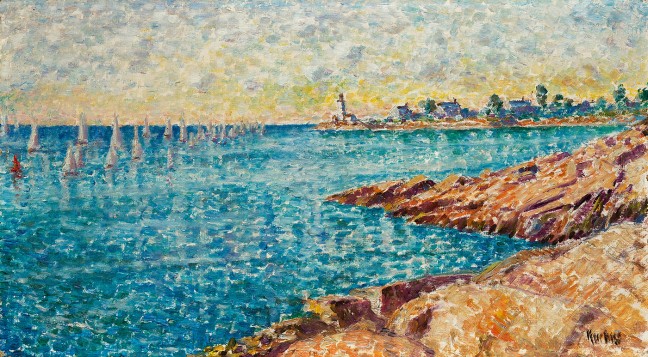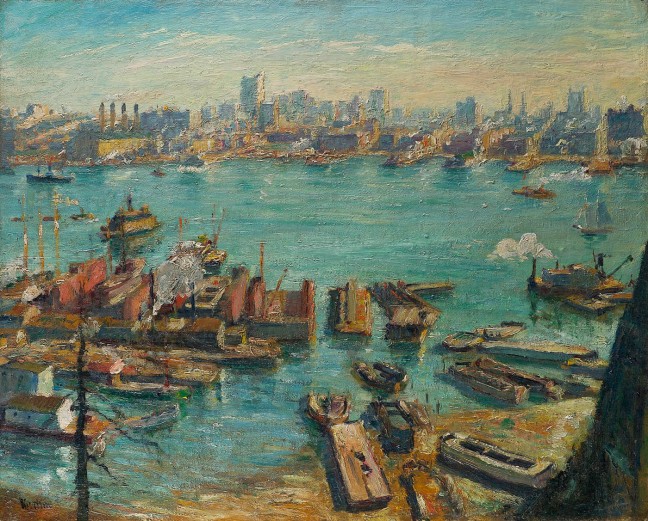Biography - Questroyal Fine Art, LLC, New York, New York
By Chelsea DeLay
Max Kuehne was born in Halle, Germany on November 7, 1880. His family immigrated to the United States in 1894 and settled in Flushing, New York. Growing up, Kuehne led an active lifestyle and enjoyed many outdoor activities; Richard, the artist’s son, fondly reminisced on his father’s boyhood years, describing, “whatever job he held was somehow always terminated by the advent of summer when the water was warm and there was swimming from the East River piers, rowing races on the Hudson, bicycle races at the Hippodrome, or sailing in Flushing Bay on Long Island Sound.”
It was not until he was twenty-seven years old that he began to formally pursue a career in art; despite such a late start, Kuehne was fortunate to study under William Merritt Chase and Kenneth Hayes Miller at the New York School of Art in New York City, and later became a pupil of the renowned Ashcan leader Robert Henri. They instilled in Kuehne the values and methods of both Impressionism and Realism, which formed the foundation for his future career as an artist.
In 1910, Kuehne sought inspiration overseas and traveled to Europe, where he bicycled through Germany, England, France, Belgium, and Holland, often accompanied by his close friend and colleague Ernest Lawson.
After returning to New York City the following year, Kuehne set up a studio in Greenwich Village, where he became friends with neighboring artists that included Guy Pène du Bois, William Glackens, William Zorach, and Maurice and Charles Prendergast. The next four years were spent producing urban scenes depicting the downtown life and painting along the East River and its bridges.
During the summer of 1912, a pivotal shift in Kuehne’s career began when he visited Gloucester, Massachusetts, which resulted in a body of work described as “some of his most successful pictures, paintings full of sunlight…[which revealed] the fact that he was becoming a colourist of considerable distinction.”(3) From these early harbor scenes, a clear understanding of subject matter and brighter color palette began to emerge—characteristics which were further developed during a trip to England in 1913 when he painted rocky seascapes of Cornwall. After spending a year working along the Cornish coast, Kuehne moved to Spain and fell in love with the country’s landscape and culture.
The city of Granada became his home for the next three years, where he reconnected with Ernest Lawson, who was also painting in the country at the time. Kuehne absorbed elements of Lawson’s style while the two spent time together in Spain, and incorporated his romantic approach into sober nocturne scenes and mysterious, moonlit landscapes.
In 1918, after he returned to the United States, Kuehne spent the summer in Cape Ann, Massachusetts, where, beginning in 1920, he would return every summer. He eventually established a studio in Rockport, a coastal town that inspired luminous marine scenes and dramatic landscapes that are considered some of Kuehne’s best works. Two years passed after his stateside return before the allure of Spain drew him back to the country for a second time in 1920, and once more for a third visit in 1922. He returned again in 1923, after which he spent a brief time in Paris; the pictures painted that year demonstrate a unique brilliancy and looser handling than his usual technique.
The artist enjoyed the patronage of several notable collectors of his time, including Gertrude Vanderbilt Whitney, Mrs. Harry Payne Whitney, Juliana Force (the founding director of the Whitney Museum of American Art), noted critic and collector A. E. Gallatin, Archer Huntington, Duncan and Marjorie Phillips, and Dr. Albert Barnes of the Barnes Foundation. Kuehne’s works were widely displayed throughout his career, including exhibitions held by the Carnegie Institute, The Art Institute of Chicago, Worcester Art Museum, Pennsylvania Academy of the Fine Arts, Corcoran Gallery of Art, Society of Independent Artists, and Whitney Museum of American Art, to name a few. During the Depression, Kuehne expanded his career into the realm of decorative arts. He became quite skilled in the art of frame making, crafting expertly designed, carved, and gilded frames for not only his work, but also Maurice Prendergast, Charles Sheeler, and Ernest Lawson.
Examples of Kuehne’s work are included in prominent museum collections including those of The Barnes Foundation, Brooklyn Museum, The Metropolitan Museum of Art, The Museum of Modern Art, and Whitney Museum of American Art.
Chronology
1880 Born in Halle, Germany
1894 Moves to Flushing, New York
1907 Begins formal training at the New York School of Art, studies under William Merritt Chase and Kenneth Hayes Miller
1908 Enrolls at the National Academy of Design
1909–10 Studies at the William Merritt Chase School with Chase and Miller, enrolls in night classes taught by Robert Henri
1910 Spends the year abroad studying works in principal galleries in England, France, Germany, Holland, and Belgium
1911 Opens studio in Rockport, Massachusetts
1912 Spends the summer in Gloucester, Massachusetts
1913 Travels to England, spends time painting along the coast of Cornwall
1914–ca. 1917 Visits Spain for the first time and ends up living there for three years, spends eighteen months residing in Granada
1918 Returns to the United States, travels to Gloucester, Maine in the summer
1919 Spends the summer in Maine, paints in Bar Harbor and Rockport
1920 Returns to Spain in July
1921 Spends the summer working in Rockport, Massachusetts
1922 Returns to Spain
1923 Returns to Spain for the last time, spends summer and autumn in Paris
1925 Takes up residence in Rockport, Massachusetts
1940 Five etchings used as illustrations in James B. Connolly’s The Port of Gloucester; joins the Rockport Art Association
Exhibitions
1912–37 Corcoran Gallery of Art, Washington, D.C., biennials (6 times)
1917 Society of Independent Artists, New York, New York
1918–41 Whitney Museum of American Art, New York, New York
1919 Jesup Memorial Library, Bar Harbor, Maine, solo exhibition
1920 Detroit Institute of Arts, Michigan
1921 C.W. Kraushaar Art Galleries, New York, New York, solo exhibition
The Whitney Studio Club, New York, New York
Architectural League, New York, New York
1925 Art Institute of Chicago, Illinois
1926 Carnegie Institute, Pittsburgh, Pennsylvania, prize
1927, 1929–30 Art Institute of Chicago, Illinois
1930 Worcester Art Museum, Massachusetts
1930–35 Pennsylvania Academy of the Fine Arts, Philadelphia, Pennsylvania
1935–37 Art Institute of Chicago, Illinois
1968 Hirschl & Adler, New York, New York
1972 Hirschl & Adler, New York, New York, solo exhibition
1998 R.H. Love Galleries, Chicago, Illinois, solo exhibition
2001 Hollis Taggart Galleries, New York, New York, solo exhibition
2011 High Museum of Art, Atlanta, Georgia
Questroyal Fine Art, LLC, New York, New York
Max Kuehne (1880–1968)
Annisquam Regatta
Oil on board
11 15/16 x 21 5/16 inches
Signed lower right: Kuehne
Max Kuehne (1880–1968)
Across the Hudson
Oil on canvas laid down on board
24 x 30 inches
Signed lower left: Kuehne; inscribed on verso: Across the Hudson / Max Kuehne
The Hispanic Society of America
Max Kuehne, Segovia Cathedral, 1916,
Oil on panel 12.5 x 15.7; A241
Skinner
Max Kuehne (American, 1880-1968) Rockport Harbor
- Auction:
- American & European Works of Art - May 29, 2015
- Estimate:
- $15,000 - $25,000
Max Kuehne (American, 1880-1968) In the Harbor, Provincetown
- Auction: American & European Works of Art - Sep 24, 2010
- Sold for:
- $4,148
Max Kuehne (American, 1880-1968) Smith's Pier-Provincetown
- Auction:
- Discovery - Apr 14, 2010
- Sold for:
- $2,370
-
Max Kuehne (American, 1880-1968) Street Scene, Rockport, Mass.
- Auction:
- American & European Works of Art - Mar 07, 2008
- Sold for:
- $1,185
Max Kuehne (American, 1880-1968) Town Square
- Auction:
- American & European Works of Art - Mar 07, 2008
- Sold for:
- $1,067
Max Kuehne (American, 1880-1968) Fishing Wharf, Gloucester
- Auction:
- Sale #2366 - May 18, 2007
- Sold for:
- $1,645
Max Kuehne (American, 1880-1968) Pigeon Cove, Rockport
- Auction:
- Sale #2366 - May 18, 2007
- Sold for:
- $1,645
Max Kuehne (American, 1880-1968) On the Water
- Auction:
- American & European Works of Art - Sep 16, 2005
- Lot:
- 645
- Sold for:
- $3,055
Christie's
RoGallery
Title: Untitled - Lakeside Houses Year: circa 1960 Medium: Double-Sided Watercolor, signed l.r. Size: 15 in. x 19.5 in. (38.1 cm x 49.53 cm) Price: $1800
Don Barese
Fine Art and Antiques
|
||
7" x
9"
Oil on Board
|
||
1920s
|
CGFA
Main Street in Gloucester

















